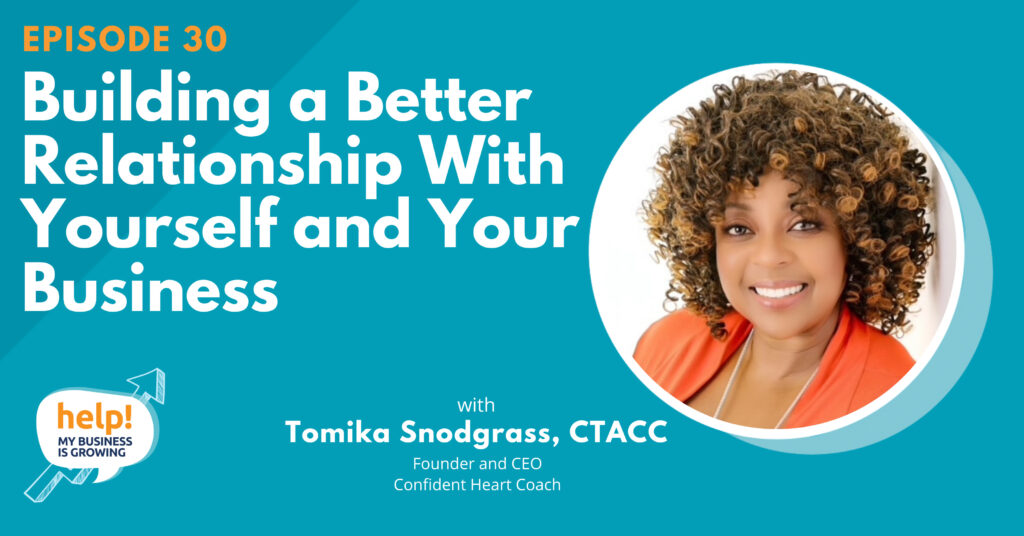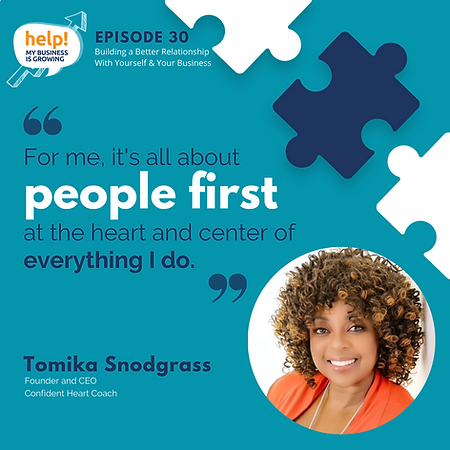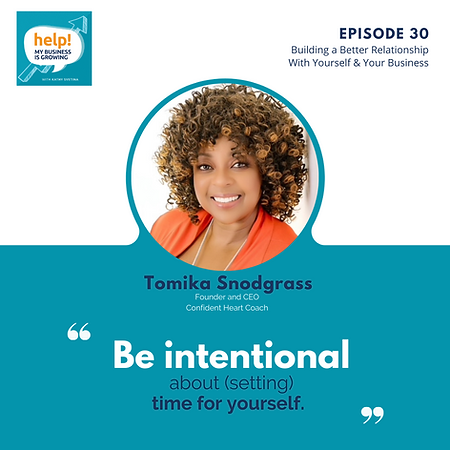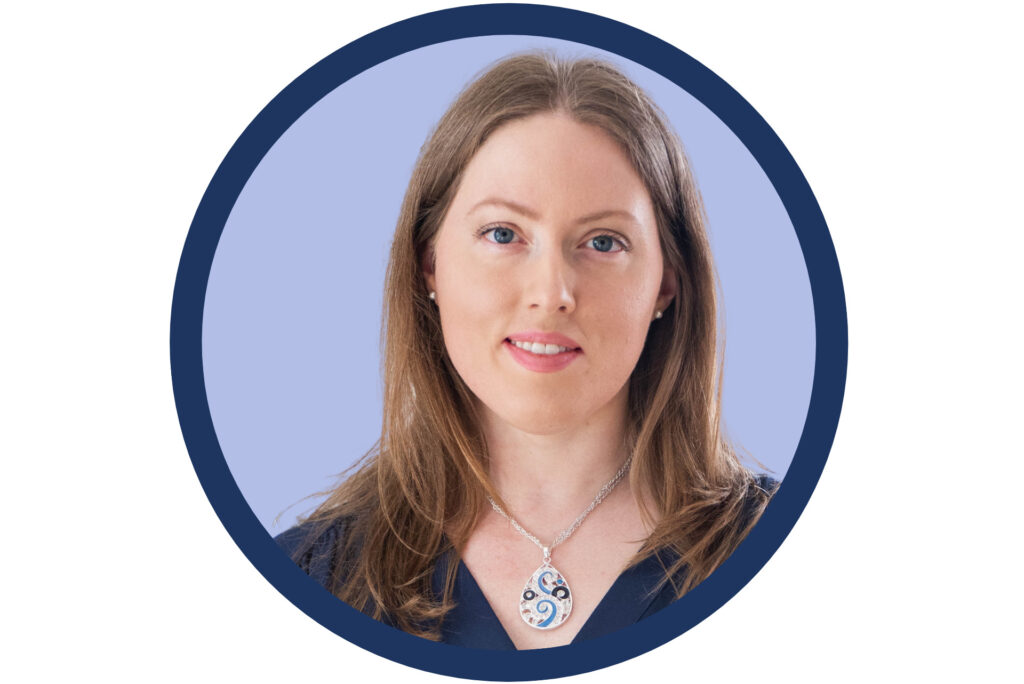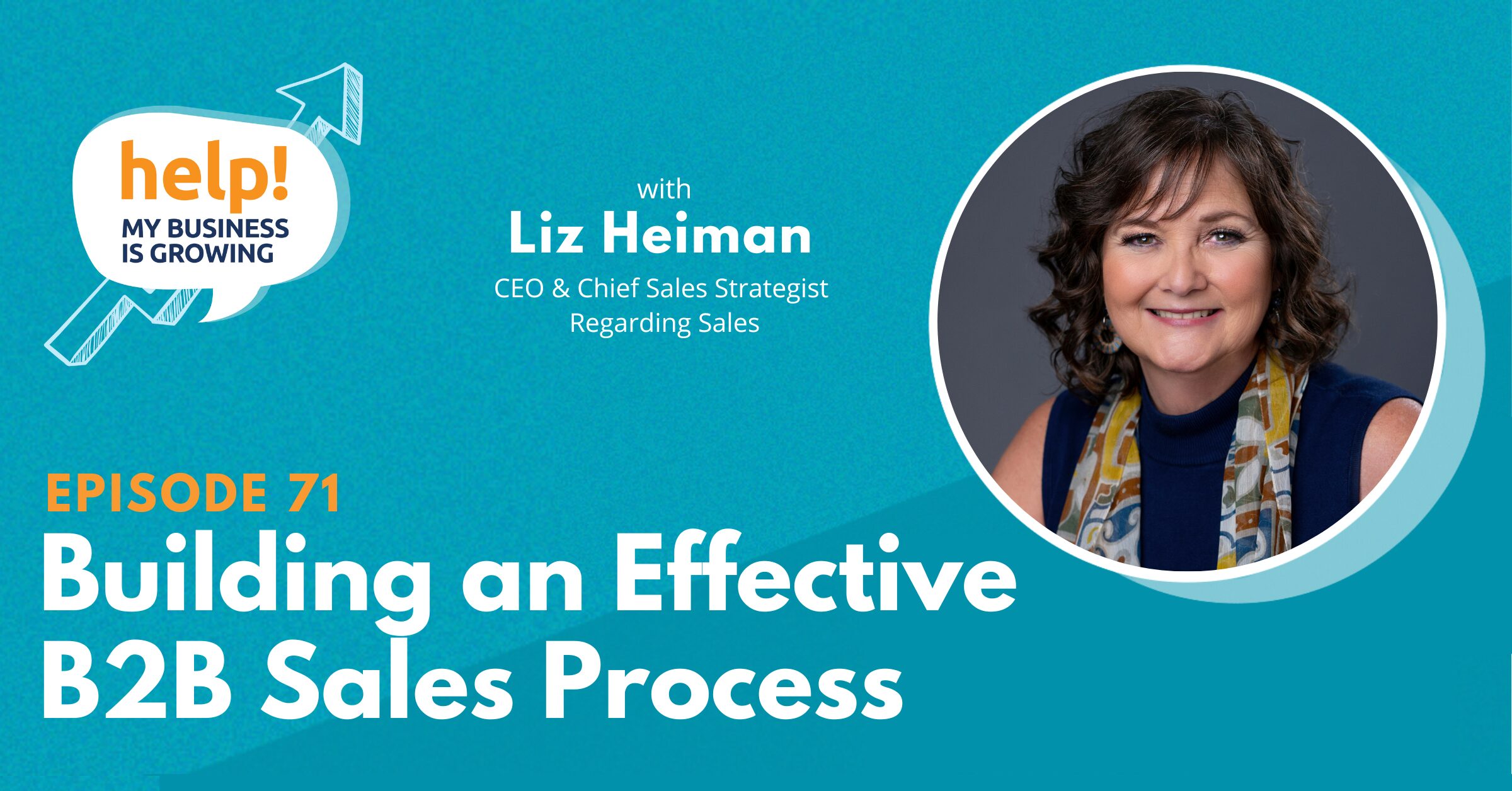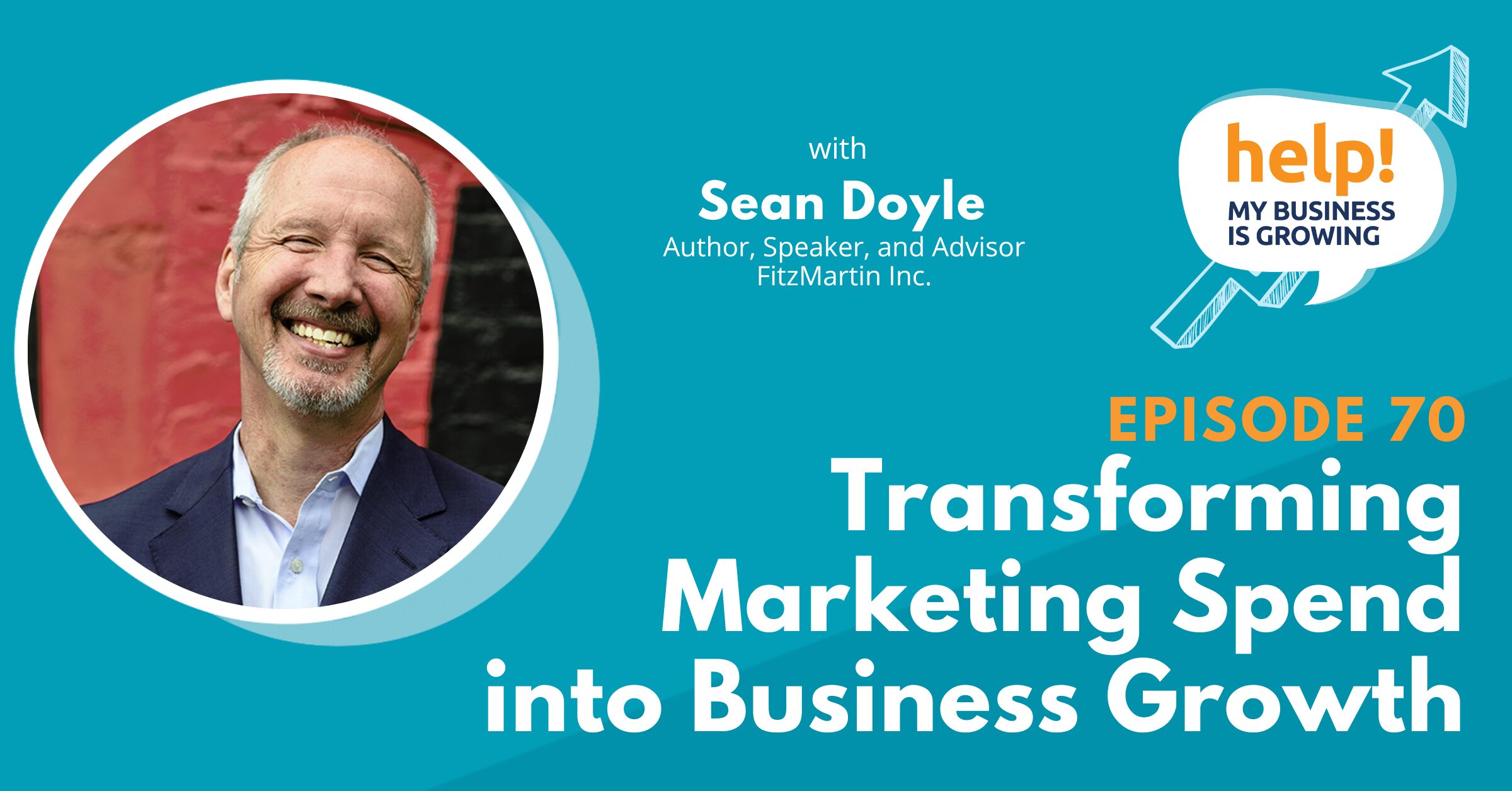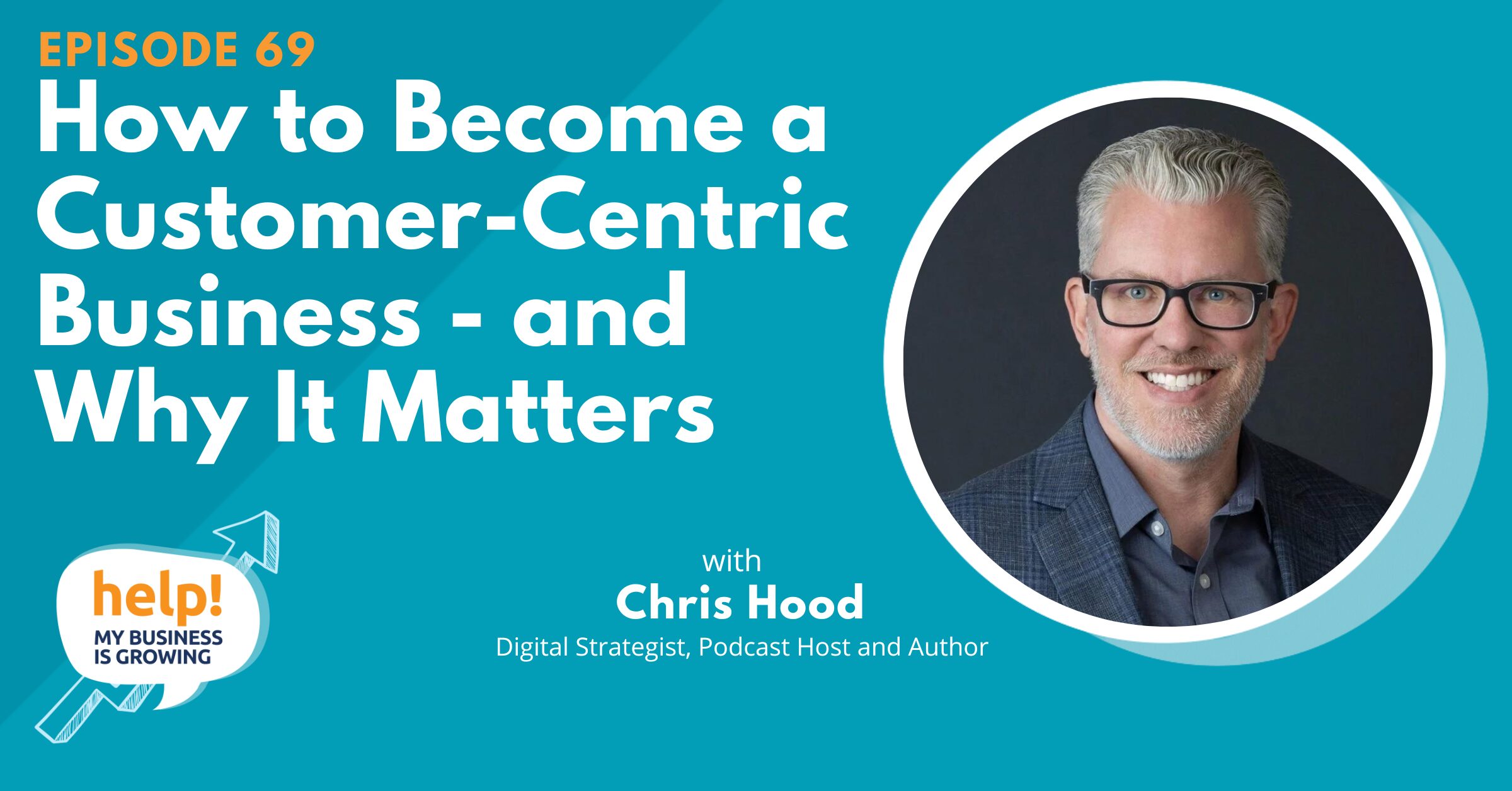So how do you start cultivating a good relationship with yourself to benefit your growing business?
She shares how to get started and outlines helpful tips and techniques to ensure you stay on course and keep going.
Having a good relationship with yourself will directly benefit your leadership style as well.
They are afraid to reach out to prospective clients and say, “Hey, here’s what I do. I’d love to talk to you to understand your challenges so we can figure out if we’re a good fit.”
To support this process, commit to connecting with five potential clients or prospects in your target audience without being “sales-y” but to reach out and introduce yourself and say, “Hey, I’d love to get on a phone call or zoom call and connect” and then build from there.”
Find your “tribe” that will hold you accountable: be it reaching out and connecting with clients or ensuring you take proper time off for yourself.
It could be quiet coffee time or a short walk but set that time aside to help you recharge and focus on yourself, and you can then go about your day full of energy to do what needs to be done.
You won’t be able to give anything of yourself – your time and fully engaged self to your business. You can’t pour from an empty cup, so you have to ensure your cup is full first, and you can do this by taking dedicated breaks or vacation time for yourself.
Kathy (host):
Well, hello there and welcome back to Help! My Business is Growing, a podcast where we explore how to grow and build a business that is healthy and sustainable. I’m your host, Kathy Svetina.
Kathy (host):
Whenever we mentioned the word relationship, the top-of-mind definition would usually be in the romantic or familiar kind. Then, of course, there are relationships that you share with your friends, and with people at work. You can even include relationships with your customers and suppliers and the business itself.
Kathy (host):
But, you know, as we’re often swept away by this daily grind of business, we forget about the one relationship that might even be considered the most important of all, and that is the relationship with yourself. Because this relationship greatly impacts how you feel about yourself and others. And of course, it affects how you handle your business. It shows up in your confidence level, it shows up in leadership style, and it shows up how you are dealing with challenging issues that arise in your business. So the question is, how do you cultivate a good relationship with yourself when you’re running a growing business? And what are the benefits? And how do you even start?
Kathy (host):
Just a quick reminder, all of the episodes on this podcast, including this one, come with timestamps for topics that we discuss and each one has its own blog as well. You can find all the links and the detailed topics in this episode’s show notes.
Kathy (host):
My guest today is Tomika Snodgrass. She is the Founder and CEO of the Confident Heart Coach. She is a Certified Business Coach, Relationship Strategist Lead True College Facilitator, and Motivational Speaker who is known to set the stage on fire as she powerfully delivers on topics that include leadership, women’s empowerment, and the power of positivity. As a result of her relationship and business development programs, Tomika’s clients push beyond their doubts and fears. They walk boldly in their purpose with an abundance of joy and happiness and show up in every aspect of their lives fully and unapologetically with confidence and enthusiasm. Tomika’s mission is to help every phenomenal woman to spark joy and happiness in her personal and professional life. Join us.
Kathy (host):
Welcome to the show, Tomika.
Tomika (guest):
Thank you for having me, Kathy, I’m excited to be here.
Kathy (host):
I’m excited to have this conversation, because you have a saying, and excuse me if I butcher this, but it goes, “A good relationship with yourself as the glue that makes it all hang together.” And out of all the things that I’ve learned over the years by being in business by myself and working with other business owners is that the success of the business is actually related to how we feel about ourselves. I’m not a rude person by any means. I’m very analytical. But I have observed that this type of stuff really tangibly shows up in at least two areas – in the business, the energy levels, and the leadership style. I’d like to talk about first, why is cultivating a good relationship with yourself really important to someone who is running a business, especially a growing business.
Tomika (guest):
Well, I think you hit the nail on the head. It’s so important to connect with yourself, to have that confidence, to know your worth, to know your energy levels, who you like to work with, and who you don’t like to work with. All of those things matter. I think that comes with being grounded and centered in yourself in your relationship with yourself, and your own value that comes across. It comes across if you do have employees that you’re working with as an entrepreneur, and also with your clients, you know, and as you said, you’re in your leadership style. For me, it’s all about people first and putting clients at the heart and center of everything that I do. And I think that comes across that my clients understand that I really care about them. I care about their outcome, and I care about the results that they’re getting. But I can’t deliver that if I don’t care about myself. The results that I get from myself first.
Kathy (host):
So the clients that you work with, I would imagine that they struggle with this concept. That’s where they would come to you. What are some of the things that are tangibly happening in their business that they realized, “I might have lost my way here.”
Tomika (guest):
Oftentimes, I focus on sales, and I’ll take a step back and share with you why that is. At first, I started off focusing more on relationships, which is fine. My husband and I have been married for 26 years. And you know, so I had-
Kathy (host):
Congratulations!
Tomika (guest):
And so I thought I’ll start off as a relationship coach, but I was ignoring that business side of myself. I also shared with you that I have over 30 years of banking experience, predominantly in the corporate banking world. And so one of the things that new entrepreneurs come to me specifically and talk about is the ability to cultivate those relationships, and then have productive sales conversations. In other words, attracting clients and closing sales. So those are the things that my clients struggle with.
Tomika (guest):
And why do they struggle with that a lot of it is low self-worth, lack of confidence and self-esteem, not feeling like “I’m good enough. Nobody’s going to take me seriously.” It’s a lot of that impostor syndrome. Getting in your own head about what other people are going to think about you. And so I run into a lot of clients who are on social media, when I asked them, “What are you doing to attract clients? What are you doing to grow your business?” They’re on social media. They’re posting. They’re getting lots of engagements, lots of likes, lots of comments, and lots of shares. But the clients aren’t coming. So there’s that disconnect, and the clients aren’t coming. Because we’re afraid to reach out and say, “Hey, here’s what I do. I’d love to talk to you and understand what your challenges are so that we can figure out if we’re a good fit.” You have to have these conversations, right? There’s no other way to do it. And that’s what I say you have to have the conversations. There’s no other way to connect with people than to reach out and connect with the people. So you got to do it.
Kathy (host):
Yeah, and the likes and the comments are not gonna pay for your mortgage bill. It just not gonna happen.
Tomika (guest):
Right. I say that all the time. That’s nice. But that does not pay the bill. Let’s get some clients.
Kathy (host):
Once they start working with you, what does that really look like in terms of developing their self-esteem and their self-worth, and making sure that now they feel confident making those types of conversations? How does that process look like? Like walk me through? I’ve seen a lot of like motivational speeches that people do. But unfortunately, those are very, I would say, fleeting because you get just a little bit, you’re very pumped, you’re like, “Yes, I feel great. I’m going to do those right now.” But you know, then comes the next day, and you’re like, “Oh.” It kind of wanes off. So how does that look like so that the motivation stays there?
Tomika (guest):
We start with a lot of mindset work and really digging into “Where’s that coming from? Where’s it coming from that you’re not enough? Where’s it coming from? That you can’t reach out to clients? Who told you that? You can’t do that?” You know, so we do a lot of that mindset work there.
Tomika (guest):
And then the next step is still mindset work. But “What would it look like if you did reach out? What would happen if you did make a phone call? What would happen if you did send a direct message and connect with someone? What does it feel like? What does it look like?” So just walking through that whole journey from, “I can’t do it” to “Why can’t you do it? And then here’s how we do it. Yes, you can do it, and you are doing it.” So we just kind of go through the journey together.
Tomika (guest):
The scariest part is taking that first step and doing it and so I put my clients into action right away. “Today, I want you to connect with five potential clients, five prospects that are in the target audience that you have not yet introduced yourself to.” So not even being salesy. We make it feel as comfortable as possible, because it’s all about developing the relationship anyway, reach out and introduce yourself and just say, “Hey, I’d love to get on a phone call with you and get to know you. I’d love to get on a zoom call and connect with you”, and then build from there.
Kathy (host):
And I think one thing that’s really important to hear what I have seen, even for myself is that accountability factor. Because I think the problem when you are running your own business, and especially if it’s there’s a lot of things are happening. Either you’re just starting out, or you have a growing business where there’s a lot of chaos going on, there’s so much things that you feel kind of lonely and isolated. Because of that loneliness and isolation, it adds an extra level of overwhelmed, which can be at the point of “You just go take a nap because I’m so overwhelmed by it.” How does that accountability factor? How does that help with being more productive and doing the things that are really, really important to the business?
Tomika (guest):
It’s huge. I actually did a post on that on LinkedIn not too long ago about the importance of your inner circle. And surrounding yourself with diverse groups of individuals, not just like-minded people, right? But successful people who can push you encourage you to support you in every way. And I think that’s so important for us to find our tribe and to find those who will hold us accountable.
Tomika (guest):
I had a friend on LinkedIn who said “Hold me accountable for reaching out and connecting with clients.” And I’m like, “Okay, I’ll check on you every week or so and see how many people you’ve connected with last week.” So it does make a difference because like you said, it can be very lonely and we tend to focus on the things that we love to do and to put off the things that we don’t love so much and unfortunately, sometimes it’s reaching out and doing that client outreach that we don’t love to do.
Tomika (guest):
But that’s the most important thing that we need to do. I would say having an accountability partner is huge. And having that circle of support is so important. All those people that are going to cheer you on, and just support you. Whether it’s in person or on social wherever you hang out.
Kathy (host):
Yeah, and when it comes to doing the things that you love, and we’re so. I am so guilty of that, because it can so easily you just like, I want to focus on the things that I love. But everything else feels like eating broccoli. Even though I love broccoli, some people don’t I know. So broccoli is a good analogy there. How can you go and find people like that that will hold you accountable, because it has to be someone who’s invested enough in your business, and then it has to be very consistent? I would imagine it cannot just be someone that does a once or twice a month, and then they just forget about it. Right? It has to be very consistent. But what do you find those type of people that would be able to be an accountability partner for you – a good accountability partner for you?
Tomika (guest):
I think start from your closest inner circle and work out from there. So oftentimes, it’s right within your own family, right in your own circle of friends. So oftentimes, it’s going to be a close family member, if you don’t have anyone else, you know, it could be your mom. Your mom’s always going to be your truly, you’re always going to support you, you can start there. And then as you develop meaningful relationships, it could be a very close friend, a friend who’s an entrepreneur, or a friend who’s incorporated and having success. You reach out to that person.
Tomika (guest):
And then maybe you make a connection on LinkedIn. And you see that person getting some traction and having success. And you reach out to that person and invite them into your inner circle.
Tomika (guest):
I think it’s so important to cultivate that inner circle and to invite the right people in. So you make a good point. But I start right within my own family, and then with my own closest friends that are similar to me in terms of wanting success, wanting to be a cheerleader for each other, and wanting to support each other.
Tomika (guest):
I always share. I have my little picture here if you don’t mind me sharing, on my desk. These are my six best friends. This is my closest inner circle. All business women killing it. And some of us go back almost 30 years. That’s the importance of it. And that’s what it means to me. It’s just having those kinds of people that you can pick up the phone and say, “Hey, I need you to hold me accountable for doing this in my business. I’m not showing up the way I want to. Here’s what I need for you.” And you know, they’re going to be there and they’re going to do it. So that’s what I’m talking about. Not just anybody. It’s important to have the right, the right connections.
Kathy (host):
Yeah. And you gotta cultivate those right connections. And if you don’t have them right now, it just you have to it, unfortunately, it takes some time to develop those types of connections. Right?
Tomika (guest):
Right. Exactly. Yeah. We talked about accountability being a big piece of it. But what are some of the other tools and techniques that you can use to develop this better relationship with yourself and meaning have a better business because of that?
Tomika (guest):
We hear so much about self-love and self-care. Right? But it’s key. It’s so important. And that’s something I had to really learn over the years. Because I’m naturally a nurturing person. I’m the type that puts other people first. I think most women can relate to that.
Tomika (guest):
But it’s really about learning how to prioritize yourself, first, take care of yourself first. And so what I started doing a few years back, is creating a morning ritual for myself, where I’m putting myself first from the time I wake up in the morning, nobody else, not the kids, not the husband, not work, me. All right. So for me, that required me to get up just a little bit earlier, so that I could do the four things that I need to do that make me a better person that allow me to have a better relationship with myself. And those things are prayer, meditation, I always say hydration. I drink a big bottle of water, you know, get myself hydrated, and then just sit quietly and just be by myself whether I’m going to write in my journal, or I’m going to sit quietly and read a little bit while I’m having my morning coffee. Those are my deal-breaker morning rituals that I always do every single morning and I don’t care if it’s for five minutes, or if it’s for 20 minutes, but that’s my time and it’s just for me and no one else.
Tomika (guest):
So that’s something that I always invite people to do is have a morning ritual or doesn’t have to be morning. I just happen to be a morning person. It could be in the evening, set aside time that’s for nobody except for you and decide what are the things that you need to do to care for yourself in that moment, and it’s different for everybody. For me, my morning time is everything. And that helps me to set the tone for my day. Right? And then I’m energized, and I’m ready to go off and do the tasks that I need to do in my business.
Kathy (host):
Yeah, I’m not a morning person. But I do have an evening ritual that I use. And I like to usually just have a shower, then I have some tea. I like to go and relax in the evening. So I’m a huge fan of Frasier, which was an old TV show back in the 90s. So I would watch that a little bit. Yeah, disconnect from the world. I watch an episode or two. I know them by heart by now. But it is silly. But it’s something that really nurtures me and it prepares me for sleep.
Tomika (guest):
There you go. And it’s not silly, because it’s for you. It doesn’t matter. If that’s what somebody else would do. That’s what makes you feel happy. Right? And to get yourself prepared for nighttime, for rest. And I think that’s important to do that in so many of us. I know for years, I did not. I was running and running and trying to make sure everybody else is happy, mom is happy, the mother-in-law, the kids, the husband, everybody else. But what about me, I’m depleted, I’ve got nothing left. You can’t give to your business. You can’t pour from an empty cup. You have to make sure your cup is full first.
Kathy (host):
Yeah, and this is also an important point. And I love that when we started talking about this as the importance of taking breaks, not just daily breaks, but also taking a vacation or just having a dedicated time. And I know I’ve been guilty of that, too, is that on the weekend, that would still work. And it gets to a point where even you don’t have to, you do it because it becomes a habit, which just kind of feeds more into the whole idea of, “Oh, I’m working almost like a crop all the time on the clock. And it’s just it’s not healthy.” And when you get into that habit, you start making mistakes, your efficiency goes down. I mean, the business starts to suffer, it is just is so, so detrimental. And it’s really important to take those breaks. What would you say for someone who’s stuck in that carrying phase right now that it became like a vicious cycle? Now they don’t know how to stop it. What would be a good way to figure this out? How do they actually like cold, stop it and take a break?
Tomika (guest):
I think it’s hard to do for some people, especially when you love what you do. I think you know a lot of people love what they do. And they don’t see it as work. They’re enjoying it. But it really is important to take that break time. And so what I talk about is just setting those boundaries, boundaries for my time, time with friends, time with family, and then boundaries for when I’m going to work in and on my business.
Tomika (guest):
What I encourage and what I invite my clients to do is actually have business hours because as entrepreneurs, as you said, we can work from sunup to sundown, even on the weekends, but set those boundaries and say, “Okay, work is from this time to this time. And this is where it ends for me,” and then block off the things that you’re going to do during the time that you’re not working, that’s really important to have something have an activity that you’re going to do. At this time, I’m going to read a book at this time. I’m going to soak in the tub. At this time, I’m going to sit quietly and have a cup of tea or a cup of coffee, or I’m gonna get outside in nature and go for a walk or ride my bike, but plan it, put it on your calendar, like an appointment and make it a priority to keep that appointment with yourself.
Kathy (host):
I like that. Putting it on the calendar, because then it just essentially does it becomes an appointment with yourself.
Tomika (guest):
Absolutely. And it’s important to do that. And for people who tend to work all the time, I’m one of those people that I could, you know, I can easily work on the weekends because I love what I’m doing, right? But I want to make time for living joyfully, happily doing all the things that I love to do. Bike riding, going for a walk, playing with my dog. I love those things, too. I make time I’m intentional about it. That’s what I’m saying be intentional about time for yourself.
Kathy (host):
Yeah. And like that. And, again, it comes down to if you start thinking of playtime and time for yourself as really a benefit to the business because it gives you more energy, you’d be more relaxed. You have more energy to give to the business as a result and more mental capacity. It doesn’t feel like you’re just walking away from the business. I think for me, originally what I struggle with was that I felt I’m taking something away from the business, which really true It’s so strange. Like, when you go into your own business, you feel like constantly you have to be working, even though you know you had great boundaries before. It’s an interesting kind of work in entrepreneurship. Is there any way that you have seen that works really well for people to take care of themselves? We talked about the rituals, we talked about taking breaks. We talked about accountability partners. Any other things that you can think of that really help as well?
Tomika (guest):
For me, it’s really about whatever you love to do, I would say just find that thing that you love and do more of that. Right? Whatever it is. And so I invite people to step outside of the box a little bit on these things. For me, it’s, it’s bike riding and getting outside in nature.
Tomika (guest):
But then another thing is giving back to others, right? I love mentoring young people, because I feel like I’m making such a big difference in the world when I’m mentoring another young person and helping them to see what it takes to have success, right, to see what it takes to find your purpose, and live intentionally and on your own terms. That’s something that I enjoy. But whatever it is for you find that thing, find that one thing that gives you focus outside of your business, where you can make a big impact in the world. I think that’s so important. And that’s completely different than those rituals. It’s not just about you, it’s about how can I share and sort of pay it forward and give back. I think that’s so important.
Kathy (host):
Yeah, I would agree with that, too. Tomika, you gave us so many great tips on that. And I asked this question to every single guest that comes with this podcast, and you’re no exception. If someone wants to get a better relationship with themselves right now, and we give them a lot of options, obviously, but they really need something actionable to do in the next week. What is it that one small thing that they can do in the next week so that they gets them closer to that better relationship with themselves?
Tomika (guest):
Meditation has been a game-changer for me. A lot of people think that in order to meditate, like you got to sit and you got to do this and close your eyes. And it’s got to be for 20 or 30 minutes. It could be for one minute, sit quietly with yourself, close your eyes, or disconnect for a moment. Breathe in through your nose, out through your mouth three or four times. Just take that moment that is just for you and just be just breathe, relax, and just be. It makes a big, big difference in terms of taking care of yourself if you just start just with that one little small thing. And then you can add to it and go from there.
Kathy (host):
Yeah, thank you for that, Tomika. Where can people find you?
Tomika (guest):
You can find me on LinkedIn. It’s Tomika Snodgrass on LinkedIn. I think with a last name like Snodgrass, I’m not hard to find. You can also find me on Facebook, and on my website at tomikasnodgrass.com
Kathy (host):
Thanks so much for coming over to the show, Tomika. Really appreciate it.
Tomika (guest):
Thank you for inviting me. I enjoyed talking to you today.
Kathy (host):
Thanks so much for joining us for this episode. And I hope that this inspired you to stop and take some time to nurture our relationship with yourself. Because successfully doing so will help you protect from the topic of our next week’s hard-hitting episode- entrepreneurial burnout.
Kathy (host):
My guest, Priscilla Stephan, and I will take a deep dive into this phenomenon and I hope that you can tune in. Also, if you love this episode, you can find all the timestamps, show notes, blog posts, and links on the website, newcastlefinance.us/podcast.
Kathy (host):
And before I go, I do have a favor to ask. If you’re listening to this apple podcast if you could please take a second and go to the show. Tap the number of stars that you think the show deserves because it helps the algorithm and it really helps other people find it too and benefit from it. Thanks so much. Until next time.
Tomika Snodgrass is the Founder and CEO of Confident Heart Coach.
She is a Certified Business Coach, Relationships Strategist, Elite True Colors Facilitator, and Motivation Speaker, known to set the stage on fire as she powerfully delivers on topics that include leadership, women’s empowerment, and the power of positivity.
As a result of her relationship and business development programs, Tomika’s clients push beyond their doubts and fears, walk boldly in their purpose with an abundance of joy and happiness, and show up in every aspect of their lives fully and unapologetically, with confidence and enthusiasm.
Tomika’s mission is to help every phenomenal woman to spark joy & happiness in her personal and professional life.
